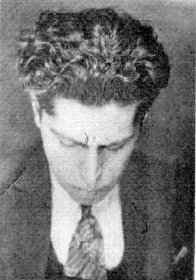
Photograph of Germán List Arzubide by Tina Modotti
Who is Germán List Arzubide?
by
Eric List Eguiluz
Although he describes himself as just a "timenaut", it is quite clear that
Germán List Arzubide is, perhaps, the most vigorous and complex
personage of 20th century Mexican culture. Germán (pronounced Her'mán)
can be understood only through the enormous diversity of his works. While
most writers are content to be classified as novelists, poets or playwrights,
Germán has been all of these and more -simultaneously. How did he
ever manage to do it all in a short one hundred years?
Germán the Historian
First cover by Leopoldo Mèndez
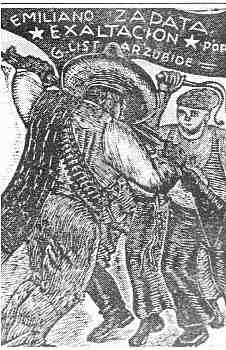 The historian
reads Germán's works and finds an erudite contribution to the history
of the Conquest of Mexico, of Mexican Independence, the Mexican "Reforma"
and the period of the Revolution and then is surprised to learn that Germán
actually discovered Emiliano Zapata. How? Well, after the fighting was
over and notwithstanding having fought against him (not metaphorically
but as an armed combatant in Carranza's army), Germán discovers
the real Zapata having taken upon himself to interview veterans of Zapata's
army in the state of Morelos. He explored both the enemy's territory and
his ideals and emerged with the first book written about Zapata, " Zapata,
exaltación", thus converting someone considered up to then to be
a mere bandit into the national hero that historical fact and retrospect
have proven him to be.
The historian
reads Germán's works and finds an erudite contribution to the history
of the Conquest of Mexico, of Mexican Independence, the Mexican "Reforma"
and the period of the Revolution and then is surprised to learn that Germán
actually discovered Emiliano Zapata. How? Well, after the fighting was
over and notwithstanding having fought against him (not metaphorically
but as an armed combatant in Carranza's army), Germán discovers
the real Zapata having taken upon himself to interview veterans of Zapata's
army in the state of Morelos. He explored both the enemy's territory and
his ideals and emerged with the first book written about Zapata, " Zapata,
exaltación", thus converting someone considered up to then to be
a mere bandit into the national hero that historical fact and retrospect
have proven him to be.
Germán the Playwright
A dramatist will read the theatrical writings of Germán and discover
that he founded the Modern Puppet Theater of Mexico writing the first complete
play for puppets - a play that, incidentally, has been presented everywhere
puppet shows are produced. "Comino Conquers the Devil" was written over
67 years ago and is the one Mexican puppet play that is known throughout
the world. Also, Germán was the first to write historical plays
for the country's public educational radio which he co-founded with Agustin
Yañez.
Germán the Short Story Writer
The short story writer will discover a serious intellectual who writes
fiction for both adults and children. In the decade of the forties a whole
generation grew up with "Troka el poderoso". A story on demand in all public
libraries along with many of his other educational and stimulating stories.
Germán also initiates a new literary category which could be termed
"fictional chronicles" with his amazing book that unfortunately too few
have read: "El movimiento estridentista". To read it is an unforgettable
experience. Its charming originality and verbal fireworks create a new
dimension in written Spanish.
Germán the Revolutionary
The student of the Mexican Revolution will find Germán standing
shoulder to shoulder with his comander who is struck down at his side.
Later he finds him marching off with Carranza toward the Aljibes railway
station where the tracks have been cut by the "Agua Prieta" rebellion.
Not having a horse, Germán was left behind. His fellow soldiers
set off without him and are ambushed in Tlaxcalantongo. Years earlier as
a child in the city of Puebla, he witnessed the Serdán brothers
initiate the Mexican Revolution and sees Aquiles Serdan dead just as earlier
he had seen Madero in person alive.
Germán the Journalist
The journalist is well aware of the fact that the National Prize deservedly
bestowed on Germán corresponds to his 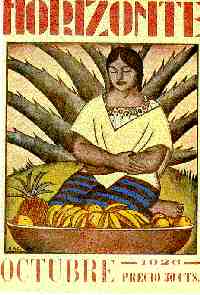 contribution
to Mexican journalism. His eighty years as an incisive member of the press
gives to him the mantle of doyen of journalism.
contribution
to Mexican journalism. His eighty years as an incisive member of the press
gives to him the mantle of doyen of journalism.
Germán the Educator
As an educator it can be said that Germán has taught constantly
and generously over the years. Vouching for a liberating as well as liberal
education, he wrote "Exercises in Non Religious Education" while on a special
scholarship awarded to him in the state of Michoacan by then Governor Lázaro
Cárdenas. This critical book was so successful that the Church placed
it on the Vatican Index threatening excommunication to those who owned
or read the book. Contrarily, in Mexico it was viewed as an honor for a
contemporary Mexican book to be placed on the same shelf as those of Copernicus,
Bruno, Kepler and Galileo.
Germán the Internationalist!
Viewed internationally one learns that Agusto Sandino personally
named him honorary Captain of the Guards. Why this honor? In time of war
and as a dangerous escapade Germán carries across the US the very
flag that Sandino captured at the Battle of Chipote. This flag proved what
was being emphatically denied: that the US was indeed intervening in Nicaragua.
The first World Anti Imperialist Congress in Frankfurt (1929) finds
Germán unfurling the flag in front of the assembly presided by Nehru,
Madame Sun Yat Sen, Katayama and others who at the time lead the wars of
liberation in their home countries. Germán received an historical
ovation that shook the assembly. That is why the Russian Workers Delegation
decided to protect him and take him for almost a year to Russia. Later
in Moscow he is given the famous Lenin Award. Daniel Ortega, decades later,
brings Germán to Nicaragua and in front of a special parade of Sandinista
Army troops bestows on him an officer's commission - a genuine rank, not
just honorary.
Germán the Poet
(Photo: Tina Modotti)
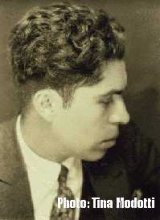 The world
of poetry cannot ignore the fact that Germán is the poet of the
"Estridentista" movement. Along with other great poets of that movement,
and as one of the most original among them, Germán has earned his
niche in Spanish Literature. While others, even the famed Maples Arce,
were still counting syllables, Germán frees poetry from all vestiges
of prosaic rhetoric. He uses novel word combinations, original metaphors
and images to set his cadence instead of relying on the conventional .
Perhaps he was the only one of his contemporaries able to reach the realm
of "pure poetry".
The world
of poetry cannot ignore the fact that Germán is the poet of the
"Estridentista" movement. Along with other great poets of that movement,
and as one of the most original among them, Germán has earned his
niche in Spanish Literature. While others, even the famed Maples Arce,
were still counting syllables, Germán frees poetry from all vestiges
of prosaic rhetoric. He uses novel word combinations, original metaphors
and images to set his cadence instead of relying on the conventional .
Perhaps he was the only one of his contemporaries able to reach the realm
of "pure poetry".
Germán the Rebel
For the political activist it is clear that Germán fought his battles
for progressive ideals such as workers' rights and free compulsive lay
education. Progressive political and social causes have always found Germán
on the firing line.
Germán as Editor
Germán has been editor to many of the brightest talents in Mexico
even if it was necessary to edit their books at his own expense. Under
the alias of "Integrales", he published two important novels of the Revolution:
"Cartucho" by Nellie Campobello; and "Asonada" by José Mancisidor.
* * *
An intimate friend of Tina Modotti and a sentimental companion of Nellie
Campobello, he has played the role of the hero, dandy and valiant (as in
the characters of the Mexican child's game "loteria"). He is father to
"more than four", a fascinating conversationalist, a world traveler, a
faithful friend, the "hatless wanderer", voice and conscience of the Mexican
Left. All this and more Germán List Arzubide has been. An homage
to Germán must cover an entire period of contemporary Mexican History
with its many personages who forged the outstanding events of their times.
Though official fame is begrudged him, his hundreds of friends
and admirers know who he is. To set forth the merits of Germán is
to praise a man who has known how to live his life and that of his country
in a way that becomes a sterling example of a life well lived.
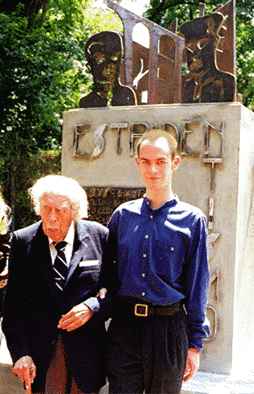
Germán and grandson Robin in front
of Robin's statue honoring the
"estridentistas" in Chapultepec
Park's Poet's Lane in 1997.
Mr. Eric List Eguiluz can be contacted in Mexico at: (52)
(55) 5553 1898.
Rape of Ruben's Woman
Two poems
The Wall of Adobes
100 years
Interview ...


 The historian
reads Germán's works and finds an erudite contribution to the history
of the Conquest of Mexico, of Mexican Independence, the Mexican "Reforma"
and the period of the Revolution and then is surprised to learn that Germán
actually discovered Emiliano Zapata. How? Well, after the fighting was
over and notwithstanding having fought against him (not metaphorically
but as an armed combatant in Carranza's army), Germán discovers
the real Zapata having taken upon himself to interview veterans of Zapata's
army in the state of Morelos. He explored both the enemy's territory and
his ideals and emerged with the first book written about Zapata, " Zapata,
exaltación", thus converting someone considered up to then to be
a mere bandit into the national hero that historical fact and retrospect
have proven him to be.
The historian
reads Germán's works and finds an erudite contribution to the history
of the Conquest of Mexico, of Mexican Independence, the Mexican "Reforma"
and the period of the Revolution and then is surprised to learn that Germán
actually discovered Emiliano Zapata. How? Well, after the fighting was
over and notwithstanding having fought against him (not metaphorically
but as an armed combatant in Carranza's army), Germán discovers
the real Zapata having taken upon himself to interview veterans of Zapata's
army in the state of Morelos. He explored both the enemy's territory and
his ideals and emerged with the first book written about Zapata, " Zapata,
exaltación", thus converting someone considered up to then to be
a mere bandit into the national hero that historical fact and retrospect
have proven him to be. contribution
to Mexican journalism. His eighty years as an incisive member of the press
gives to him the mantle of doyen of journalism.
contribution
to Mexican journalism. His eighty years as an incisive member of the press
gives to him the mantle of doyen of journalism. The world
of poetry cannot ignore the fact that Germán is the poet of the
"Estridentista" movement. Along with other great poets of that movement,
and as one of the most original among them, Germán has earned his
niche in Spanish Literature. While others, even the famed Maples Arce,
were still counting syllables, Germán frees poetry from all vestiges
of prosaic rhetoric. He uses novel word combinations, original metaphors
and images to set his cadence instead of relying on the conventional .
Perhaps he was the only one of his contemporaries able to reach the realm
of "pure poetry".
The world
of poetry cannot ignore the fact that Germán is the poet of the
"Estridentista" movement. Along with other great poets of that movement,
and as one of the most original among them, Germán has earned his
niche in Spanish Literature. While others, even the famed Maples Arce,
were still counting syllables, Germán frees poetry from all vestiges
of prosaic rhetoric. He uses novel word combinations, original metaphors
and images to set his cadence instead of relying on the conventional .
Perhaps he was the only one of his contemporaries able to reach the realm
of "pure poetry".